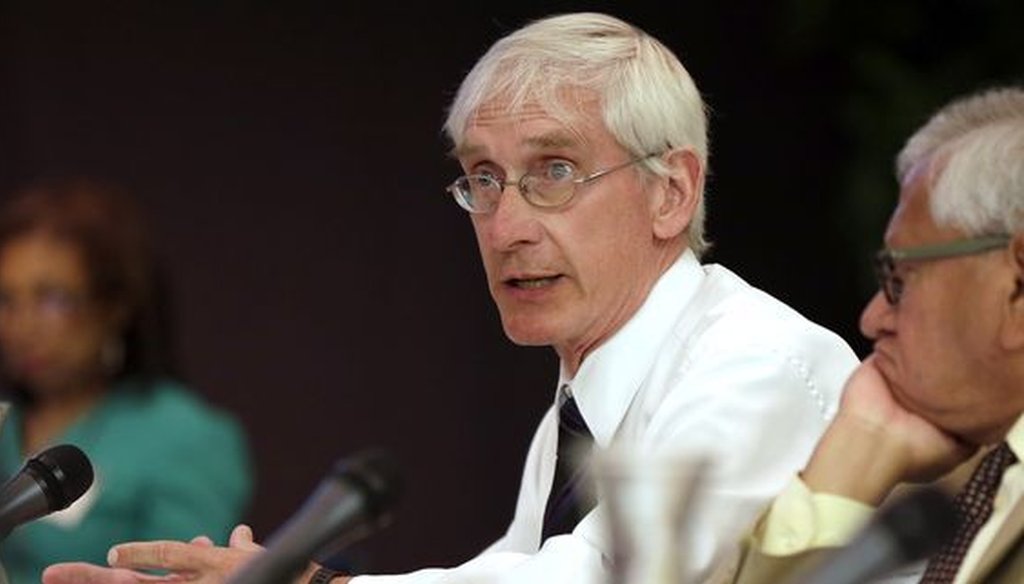Stand up for the facts!
Our only agenda is to publish the truth so you can be an informed participant in democracy.
We need your help.
I would like to contribute

Gov.-elect Tony Evers, a Democrat, succeeds Republican Scott Walker, who served eight years as governor. (Milwaukee Journal Sentinel)
Tony Evers, a longtime statewide elected official and yet not well known, steps into a much brighter spotlight Jan. 7, 2019 when he is inaugurated as Wisconsin’s governor.
The Democrat, who will leave his post as state schools superintendent, defeated two-term Republican Gov. Scott Walker to gain the promotion.
The November 2018 election campaign created a record for Evers on our Truth-O-Meter. Here’s a look at fact checks we’ve done on statements by, and about Evers -- emphasizing ones that provide insight into what to expect from him as governor.
Says Tony Evers will "raise property taxes, raise income taxes and raise gas taxes by as much as a dollar a gallon."
Sign up for PolitiFact texts
Walker made this statement in late September 2018.
At that time, Evers had pledged to eliminate a Walker-era manufacturing and agriculture tax credit. So, that will result in higher income taxes for those who have taken advantage of the credit.
Watch for PolitiFact Wisconsin's Evers-O-Meter, which will track Tony Evers’ campaign promises.
On property taxes, Evers acknowledged that his proposed budget for the state Department of Instruction could result in higher property taxes in some school districts and lower levies in others. By lifting revenue limits, however, Evers would be allowing school districts to increase property taxes. And while Evers had said he is open to raising the gas tax, he hasn’t said he would seek any particular increase and has flatly denied that it would be $1. Moreover, while Evers is open to raising taxes, it's not across-the-board, at least in the case of property and income taxes.
(Days before the election, Evers told the Washington Post he plans to raise no taxes.)
Says Tony Evers "wants to cut Wisconsin's prison population in half, a dangerous plan that today would mean releasing thousands of violent criminals back into our communities."
Evers had stated that a 50 percent reduction is a goal. But he did not put a time frame on achieving that — a crucial factor in determining whether inmates of convicted of violent crimes would have to be released. Experts say a 50 percent reduction over a relatively short period, say a few years, would require the release of inmates convicted of violent crimes. But some say it’s possible to cut the population in half, perhaps over 10 years, without the release of any violent offenders, or at least not thousands of them.
Says Scott Walker "cut $800 million from our schools."
This is relevant in that Evers has pledged to increase school funding.
Walker did cut close to that ($784 million), in raw dollars in a single two-year budget.
But that ignores changes made through Walker’s Act 10 law restricting collective bargaining by public employees, which saved school districts money. And Evers’ claim, in a TV ad, didn’t make clear that it was referring only to cuts from 2011-’13, so viewers wouldn’t know that subsequent funding increases have made up most of that reduction.
Says he "raised graduation rates to nearly 90 percent."
Evers became state schools superintendent in 2009. In the 2009-’10 year, the graduation rate was 85.7 percent. In 2016-’17, the most recent year available, it was 88.6 percent. But, like other politicians before him, Evers got off track by giving himself too much credit for changes that have many factors, including -- perhaps especially -- efforts at the local school district level.
"Under Scott Walker, the Department of Corrections has only 18 people tracking 25,000 sex offenders" and "there are nearly 3,000 sex offenders that are unaccounted for."
Evers’ claim raises an issue that perhaps he will confront.
When we checked the claim in October 2018, there were 18 sex offender registration specialists. But thousands more are involved in keeping tabs on the 25,000 offenders -- many of whom are still behind bars. There were nearly 3,000 offenders deemed "non-compliant," but that is different than "unaccounted for." A report offered a much smaller figure for those who had absconded -- that is, were refusing to keep in touch with DOC agents.
Wisconsin is "49th out of 50 states in infrastructure."
Evers’ statement relied on a too-narrow ranking that wasn’t current, and it ignored other rankings. In 2017, U.S. News & World Report ranked Wisconsin 49th in road quality — but 39th in overall infrastructure, based not only on roads but bridges, renewable energy usage, broadband access and other factors. Moreover, the magazine’s 2018 report ranked Wisconsin 26th in infrastructure. And Wisconsin was well above the bottom, though not great, in two other national rankings.
Says Wisconsin "could compel" Foxconn to install solar panels that would power 33,000 homes.
The incentives-laden deal that the state made to land the gigantic Foxconn plant under construction in southeastern Wisconsin is likely to continue to be an issue for Evers.
As for his statement about solar panels, experts said the quoted capacity is theoretically possible, though it would be extremely expensive and vastly larger than anything put on a roof in the world to date. And the logistical issues are many. Meanwhile, the Foxconn incentive agreements have been signed, so the state doesn’t appear to have a route to force such action unless outside factors lead to reopened negotiations.
"Special education categorical aid" from the state "hasn’t been raised in over a decade."
The Walker administration had launched several initiatives that featured targeted aid in the form of grants for special education students, but the special education categorical aid continued to be set at nearly $369 million. Data showed a per-pupil increase in raw dollars paid by the state, from $2,981, or 28.6 percent, per pupil in 2008 to an estimated $3,140, or 25.98 percent, paid per pupil in 2018. But that increase was more than eaten away by inflation. And the state is paying a lower share of the cost per pupil.
"At least three or four of the pieces that are in" in the Republican lame-duck legislation, Scott Walker "has vetoed previously."
There were four provisions in the December 2018 lame-duck bills that Walker has vetoed previously and that put new requirements or restrictions on the incoming Evers administration. For example, Walker previously vetoed a measure so that the Department of Transportation could continue transferring money between highway programs. But lame-duck legislation he signed prohibits such transfers under Evers. The four provisions, however, weren’t the major ones in the lame-duck session that generated so much controversy and threats of lawsuits.
"Since Scott Walker has been our governor, we’ve gone from 50 percent state funding for the" University of Wisconsin System "to 15 percent."
Evers has criticized Walker’s funding cuts to the UW System and has pledged more support. But the state share of funding to the system isn’t as low as he said.
State funding made up about 21 percent, not 50 percent, of the UW System's operating budget when Walker took office. It’s now at 17 percent, not 15 percent.
Our Sources
PolitiFact Wisconsin items as noted























